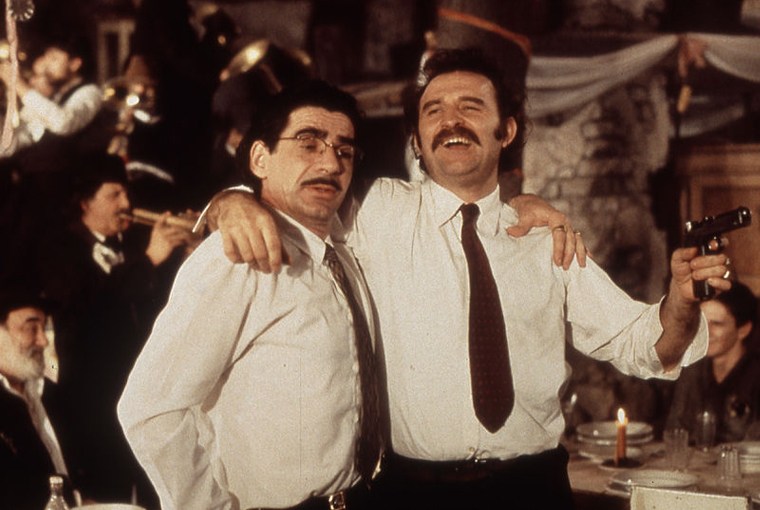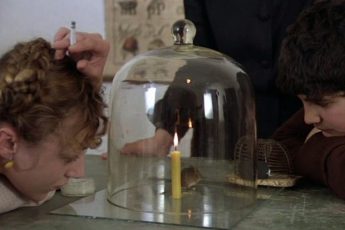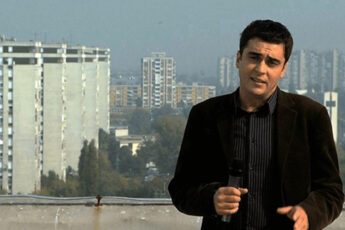Neighbors
Where do Emir Kusturica and Slavoj Žižek meet in Underground (1995)?
Vol. 13 (January 2012) by Moritz Pfeifer
For those whose outstretched lawns do not make them feel as though they are living on an island, a neighbor usually lives close by. But even when the people next door pop up in multitudes, meaning that they are above, below, and next to one’s own dwelling, they usually remain unnoticed. Who constantly thinks about friendly egg-lending Mrs. Jones from 4A when she makes one feel as though one is home alone? Some neighbors though still tend to become noticeable as they gradually metamorphose into trampling elephants, second rate rock-stars, when they go on an onion soup diet or decide to move their furniture around at 3 am. Everyone has their own stories of how the feeling to be the king of one’s castle has to surrender to the tolerant policies of urban democracy. Even friendly egg-lending Mrs. Jones from 4A can be objectified to a despicable nuisance. She then loses her good qualities and is sanctioned through the depersonalized title ‘neighbor.’ The appellation ‘neighbor’ builds a home for abreactional release. It overwrites the human qualities of the people next door with the unpleasant feelings lodging in one’s own four walls. This is the neighbor’s trap: it makes one think that one’s civilized diners are lullabies compared to the full blown parties of the ‘neighbors.’
The Serbian filmmaker Emir Kusturica and the Slovene philosopher Slavoj Žižek are neighbors. This has not always been such. They were flatmates, so to speak, until the housing policies of their country – Yugoslavia – changed and an ideological wall started running through their Commune giving each of them a different address. Žižek was the first to file a complaint, because he was annoyed by one of the films his neighbor made, not long after the separation.
In 1995, at the end of the Bosnian war, Emir Kusturica finished Underground, a confusing survey of Yugoslavia’s twentieth century history. Underground is pervaded by a mixture of cynical desperation and apocalyptic hedonism. It is centered around the triangular relationship between two half-baked bandits, Blacky and Marko, and their mistress Natalija. The following essay tries to reread Kusturica’s film with the critique of Slavoj Žižek. First, I will outline his critique which reproves the film for being apolitical, claiming that it portrays an unreflected fascination for violence. Second, I will give a reinterpretation of this critique with the help of Žižek’s philosophy itself, and lastly I will argue that Žižek’s philosophy and Kusturica’s film have more in common than they (or at least Žižek) wants to admit.
Western Gaze
Žižek’s central point against Underground, is that the film sustains violent forms of politics through the disguise of apolitical poetry. For Žižek, Kusturica’s film wants to be innocent and free of ideological bias by simply manifesting unrestrained joy. Who wouldn’t understand the profound need for comedy after half a decade of day-to-day bloodshed? The downside of this apolitical attitude, however, is that there is no way for indifferent fun to escape responsibility. Not to have a political attitude is still a choice and in every choice survives a moral standpoint. For Žižek, the problem is not whether Kusturica’s film can be read as pro-Serbian propaganda or not, which was the claim of various critics. The real problem is that it refuses to be read as anything politically specific at all. In comparison to European politics though, the film is only a harmless copycat, as detached neutrality has become the hallmark of interventional politics and impartiality the dominant Western attitude towards their self-destructive neighbors.
The controversial bulk of debates Kusturica’s film triggered seem to prove Žižek’s point. From Alain Fienkelkraut’s claim that the film is Serbian brainwashing, André Glucksmann praising the film as an anti-totalitarian manifesto, to the scholarly accounts of Dina Iordanova et al. considering that the film is not so much for something as against something, against nationalism, corruption, mafianism etc. – the film’s readings are as inconsistent as the film itself. Indeed, it is impossible to tell whether to sympathize with Blacky and Marko or whether to despise them. Maybe everybody is victim and perpetrator at once, and surely nobody in this film actually does anything good. But while this conclusion helps benevolent academics to accept the film as a critique of the bad guys it portrays, Žižek’s argument seems to disagree. Being against something is too weak of a proposition. Being against murder is not the same as being for life. Above all, it doesn’t specify what kind of murder one is against – against ethnic cleansing or against killing the people that are engaged in ethnic cleansing, or both?
According to Žižek, this “inconsistency” reflects the same problem that the West had in making sense of the Bosnian War. Instead of identifying Serbian aggression as the outset of the war, Western politicians tried to resolve the conflict by stating that “all sides are equally to blame.”1 The NATO and the UN couldn’t clearly define their enemy, which led to humanitarian failures, for example when, in 1995, UN forces disarmed Bosnian soldiers in order to protect them in a ‘safe zone’ near the town of Srebrenica, thus making it easy for nearby Serbian military to kill them. Kusturica’s film thus not only reflects the odd political discourse of Western politics, but in not being Western itself, uncritically complies with it. Most of all, the film mirrors the (perverted) fascination the West has, watching other people execute themselves:
The main obstacle to peace in ex-Yugoslavia is not “archaic ethnic passions”, but the gaze of Europe fascinated by the spectacle of these passions.2
For Žižek, proclaiming neutrality in times of conflict is the ultimate tactic of the distant observer who secretly enjoys seeing other people’s horrors. The (perverted) observer stages these horrors. The paradox is that he passively participates without having to interfere, while actively profiting from a performance he does not want to end.
The Logic of Subversion
There are several problems with Žižek’s arguments against Underground. The first and most obvious one is that it is unclear why it would be impossible for Kusturica’s film to consciously stage the perverted “gaze” at the center of Žižek’s criticism. This would follow the standard argument that everything an artwork can provoke a posteriori, is in someway inherent to the artwork itself. The “Western gaze,” passively enjoying decades of massacre and warfare, could then no longer be seen as the film’s unconscious identification with that gaze, but could likely prove the artwork’s reflective version of it. But if it is possible for the gaze to reside within the work itself, there still remains one question: how do we know that it is conscious or not?
Žižek doesn’t ask that question, as he presumes that Kusturica’s film “unknowingly” reflects the position of those who enjoy the excessive destruction of post-Yugoslavia. In another part of The Plague of Fantasies, however, where parts of his critique against Underground can be found, Žižek seems to have a different opinion. There, in an analysis on the memoirs of Daniel Paul Schreber and the film Dune, he speaks of the “logic of subversion” as the possibility for an artwork to disobey what it displays through “inconsistency.” Up to this point, “undecidability”and “inconsistency” have been the major point of critique in Žižek’s argument against Underground, as the film didn’t invest in a clear definition of the aggressors responsible for the Bosnian Wars. But now, all of a sudden, these very characteristics of inconsistency are used to exemplify dimensions of subversive imitation. So instead of saying that being unable to define the authority through which one expresses oneself (for Underground the “Western gaze”), Žižek now argues that the display of that very authority “in all its inconsistency”3 has a subversive effect. How?
The argument of subversive inconsistency is based on the assumption that the confrontation of some accepted truth with its inherent falsity, might uncover lies, but doesn’t help anyone to come to terms with more fundamental truths of denial, self-aversion, bad conscious, etc. Žižek’s philosophical mission, of course, is not to search for truth, but for the fantasies that make truth possible. So instead of blinding oneself with the belief that a lie is truly false (i.e. that it never existed), the real task is not to display its “true” meaning, but to make visible the fantasy that sustains the lie. To take an example from Underground: there would be no point in discovering that the slaves working for Marko in the “underground” are actually not working for Tito’s “liberation” of Yugoslavia, which is precisely what happens in the end of the film, when one of them, Marko’s brother Ivan, is told that World War II is over, that Tito is dead, etc. In order to truly understand Ivan’s situation it would be more useful to ask : what made Ivan believe in the different reality in the first place?
Thus Ivan’s alter ego, the ape that accompanies him, tells us more about this fantasy than the “moment of truth,” when he finds out who kept him in the cellar for forty years. But the crucial point of subversive inconsistency is that the ape alone cannot provide insight into the self-enslaving fantasy Ivan is a victim of. This is why exaggeration in itself is not necessarily subversive. The emblem of Marko’s arms trade also figures the image of an ape, so there would be no point in “imitating” the same exaggerations the authority that keeps him locked in also uses.4 In the end, Ivan regresses into this phantasmic exaggeration, practically turning into an ape (later in the film, we can even see Ivan on a tree). So the only possibility for Ivan to become aware of this fantasy would be to change his subject-position, and identify with something radically different. If, for example, he would identify with Blacky’s “liberating” aspirations (who is also kept underground), while at the same time assuming the position of the ape, the inconsistency of being a “locked-in liberator” would make him aware of his phantasmic bond. (Ironically, the ape goes through this process, using the tank to break free). The same goes for Blacky. If Blacky could identify with the ape, thinking at the same time that he is a real revolutionary, he might be able to drop his phantasmic revolutionary zeal. To become inconsistent, is to establish the proper distance towards oneself and others from where it is possible to change. Thus Ivan’s problem is not that he doesn’t know the truth about the authority who keeps him a cage (Tito’s Yugoslavia, or Marko’s criminal organization). It is his own personality he is unaware of.
If Žižek’s argument on subversive inconsistency applies, “undecidability” would be Kusturica’s only choice to bring to light the underlying fantasy of the “the Western gaze.” Žižek’s critique of the “Western gaze” applies to the Bosnian War, which takes place at the end of Kusturica’s film. It is not hard to find explicit inconsistency in these scenes, for example when two French UN-soldiers mediate between Marko, who has become a war profiteer, and an arms dealer. The French UN-soldiers say:
“Restez tranquille. Les Serbes tuent les Croates, les Croates tuent les Serbes. N’ayez pas peur.” (Stay calm. The Serbs kill the Croats, the Croats kill the Serbs. Don’t be afraid.)
So here is the voice of Žižek’s phantasmic kernel: the West’s incapability to find someone responsible for the war (“les Serbes tuent les Croates, les Croates tuent les Serbes”) as well as their awkward joviality in front of massacres (“restez tranquille,” “n’ayez pas peur”). But the advice “restez tranquille” is a tautology, since nobody is panicking as bombs fall and dead bodies cover the wartorn landscape. Indeed, both Blacky and Marko are as “calm” and “fearless” as one can be. Marko advises the arms dealer not to scream and to talk in a “civilized way” and Blacky acts as though he is invincible. Both characters are obvious exaggerations of what Žižek calls Balkanism: identity clichés such as seeing the Serb as “invincible Warriors.”5 Just a couple of moments later, another UN-soldier asks Blacky on what side and for whom he is fighting, trying to stop him from sending prisoners of war into a “well.” But Blacky refuses to identify with any of the terms the soldier uses (Ustasha, Chetnik, partisan), simply saying that he is Petar Popara Blacky. The “inconsistency” of the UN-soldiers is thus displayed. It is precisely the undecided position of at once calmly watching a war for the mere pleasure of watching (“restez tranquille”), trying to find nationalistic “reasons” for the war (“what are you?”) and trying to end it (“I protest sir!”).
Ironically then, what Blacky says to the UN soldier is true: “comrade.” Like allies, they are both involved in the same paradoxical phantasmic chain: the UN-soldiers protesting while comfortably watching, the Ustashas-Chetniks-partisans each constructing their national identity while passionately destroying it. “Inconsistency” is again displayed here, as one and the same person occupies multiple inconsistent meanings. The only obstacle that keeps these characters from subverting their position, is that they are not able to identify with these inconsistent meanings. Does not the refusal of the UN-soldier in accepting Blacky’s address, and Blacky refusal to be called “sir,” reveal the mutual identity they both repress? Both Blacky and the UN-officer seek symbolic justification for what Žižek would call “interpassive” aggression. So while they might stay consistent in front of themselves, it is impossible not to notice these contradictions for the spectator. In that sense, Kusturica’s film is subversive in Žižek’s sense of the term. The “perverted” gaze of the West that Žižek defined as one of the war’s main problems is revealed precisely through means of contradicting identificatory positions.
Until now, this interpretation of Undergound has only taken into consideration themes from the film’s plot and characters to show that most of the things Žižek considered as lacking in Underground, can very well be found. The other half of Žižek’s critique is a formal one. Kusturica’s film is full of references, irony and other postmodern stylistic devices. The problem with such an aesthetic is that it refuses true identification with a cause. Irony and most of all remakes or retakes of already existing films are, in a way, the expressive means of someone who doesn’t want to risk his or her own sweat and blood. With this criticism (form follows function) Žižek can return to the Bosnian War and his conception of the Western pervert who prefers to keep a distance, all the while pretending that he is actually involved.
The problem of subversive inconsistency, is of course, that it can only work via reference to already existing (subjective) structures. It has already been shown, that a fantasy can only be displayed if the subject caught in that fantasy is able to distance himself from his own position within that fantasy. The very mechanism of subversive inconsistency is thus that of self-distance. The UN-soldier can only perceive himself as “a pervert” (provided that this is the case) if he is able to distance himself from the “fantasy” that he is there to help. In other words, he would have to accept being a “comrade” (i.e. with an already existing subjective structure) who, like Blacky, enjoys watching people being send into a well (which his comrades in the scene before do for him).
Self-distance does therefore not necessarily neutralize true moral engagement. Is not the moment in that the subject perceives his own inconsistency also his only opportunity to choose: to continue to believe in the fantasy or to subvert from an inconsistent (distanciated) subject-position?
Neighbors
As stylistic devices, self-reference and distanciation are therefore only phantasmic when they repeat themselves invariably, when they remain consistent in regards of their own identificatory position. A good example for this kind of repetition can be seen in a scene in the last part of the film, where Kusturica plays the role of an arms dealer, selling weapons to Marko who has become a war profiteer. This scene recalls Fassbinder’s Die Ehe der Maria Braun, where the director also has the cameo of a smuggler. The only point of the scene in Kusturica’s film, except to show that Marko is still trying to gain profit from no matter what historical constellation, is to pay tribute to Fassbinder. It works as a kind of citational simile. Citational similes are very common in everyday language, for example when in a dialog, one is suddenly reminded of some scene from popular culture, as from films, comic books or TV-shows. Everybody who has excessively followed one or more TV-shows, knows that it turns many real-life experiences into deja-vus, where the present has a hard time to exists without involuntary allusions to past fictional counterparts.
So I would agree with Žižek that citationality and referentiality are somehow less conscious stimulating experiences. If one can only see the world in self-same variations, things like change, subversion, shift or simply just doubt seem impossible. The political implication of this argument is clear: on the one hand, it is impossible to see things from a different perspective, on the other hand, it is impossible to take the full responsibility for one’s own doings. It is important to note, however, that the so-called process of self-distance, admired in works that dispute authorship, and acknowledge the fact most writing is inspired in some way or another – collage, pastiche, mosaic –, is in reality not distanciating at all. Why would anybody call images and sentences structured in x-is-like-y grammar, where x is what one wants to say, and y is what someone else already said, distanciating when they are built upon likeness, not difference? The word distance is irritating. Repetition is the process of returning to something already heard. Citational similes repeat, they don’t alter.
Ironically though, Žižek is the master of citational similes. No philosopher likes the word “like” as much as Žižek, and no philosopher draws as much on pop cultural references to illustrate complex philosophical arguments (of Marx, Hegel or Lacan). The point of these references, however, is not so much to subvert an already existing theoretical thought but to make philosophy applicable, and to show that it has quite a lot in common with everyday life. Without a doubt, no argument can get by without illustration, and maybe the hard-to-follow-because-too-theoretical schools (of Derrida & Co) might be one of the reason for philosophers like Žižek to have reintroduced the example as a rhetoric device. More than often though, these examples have a lot in common with the theory-dropping of his predecessors. Žižek’s never ending examples also try to look at an argument from every possible point of view without producing a real perspective shift. This paradox of the so called self-distanciating reference that never changes its position can be very well observed in Žižek’s overabundant use of the expression “in other words” (ie. Plague of Fantasies, pp. 30,32). The irony is of course that there is nothing ‘other’ following these words. Žižek, even though fond of Hegel, is not the least concerned with the most basic concept of dialectics, as his associative reminiscences never have enough courage to produce an antithesis.
“This is like the old joke…” is one of Žižek’s preferred citational interventions. Everyone who has read some of his works probably knows this or similar cuts, where a train of thought gets re-explained through a well-known witticism. The same technique can be observed in Underground. Kusturica said that “in Underground, that when you translate jokes [into cinema] exactly as they are told by people, it is very effective.”6 Kusturica, like Žižek constantly uses jokes, proverbs or common expressions to illustrate plot and characters. Ivan’s ape, and his own apish behavior (Majmun!) are examples for this. “Even the famous finale, inclusive of all its grand metaphors about Yugoslavia’s break-up and isolation, is nothing else but the visual translation of the street-wise comment: ‘Our land crumbled!’ (‘Pukla nam zemlja!’).7
So this is where Kusturica and Žižek meet. Žižek’s complaint about Kusturica’s citational fuck-fest (“drinking-eating-singing-fornicating”) can be sent back to his own referential chamber from where he tears the illustrative noise that accompanies his writing. Žižek and Kusturica are thus like neighbors, quick in moaning about the other’s annoying flaws, and blind about the fact those that others could ever be disturbed by their own behavior. Indeed, Žižek’s formal critique against Underground perfectly applies to his own philosophical manners. Thus either Žižek’s argument on distance is flawed or he has to be considered apolitical himself. If one decides that not everything that is happening in Underground can be reduced to a gratuitous bulk of repeating citations, then one also has to recognize Žižek’s excursions into Hollywood as providing some insight beyond the tautological. If, on the other hand, one accepts Žižek’s premise that there is some kind of loss of involvement/awareness at stake in using figures of speech external to one’s own expressive sphere, then one cannot just oversee that Žižek’s own philosophical writing is full of these figures of speech, of citational similes.
Distance is crucial to an awareness-based experience, and the so-called distance perceived in citational variations has, in fact, more in common with solipsism and staying in one’s own four walls than with alienation or insight. Politically speaking, there seems to be no harm in identifying with an aggressor – and as a result, experience some sort of distance towards one’s own non-aggressive identity. As long as one doesn’t turn into the aggressor, identification remains crucial for the capacity to know/become aware of what an aggressor is. In a similar way, there is also no harm in looking for ever more variations of one’s own non-aggressive position, thus strengthening one’s own position, not moving away from it. I think it is obvious that Underground explores both of these possibilities. But most of the time, things are not as black and white. One can be subversive, ie. become completely distanced towards something, and yet still over-identify with it. Loyalty only makes sense through change. It was Lacan who famously insisted upon being called a Freudian…
Fantasies are not always “unknowingly” portrayed. Most of the fantasies in Underground are pretty straight-forward, and on top of that repeatedly varied. In the scene with the UN-soldier, Kusturica’s film dealt very explicitly with the fantasy that Žižek thought to reside in the deepest spheres of the filmmaker’s soul. To look for fantasies is not immune to turn itself into a fantasy. The neighbor’s trap becomes a fantasy, when one starts to hear music, imagining wild parties next door although the suspected neighbor is actually on vacation.




Leave a Comment